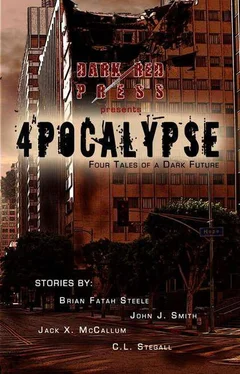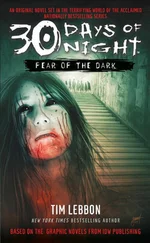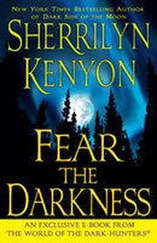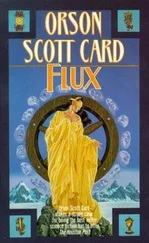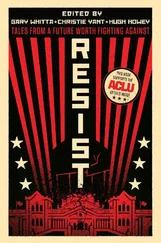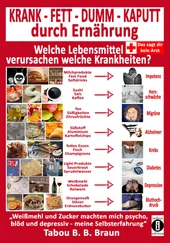We weren’t the only ones wearing bandanas. The air was thick with the smell of smoke, and a scent I realized later was burned human beings. That smell is almost impossible to describe and one I’ll never forget. It was layered. We could smell the sweet and bitter combination of charred pork, and a sharper, more awful metallic smell like burned liver that might have been overcooked blood or internal organs. That smell made this nightmare more real than anything else had, more than all I had seen, more than the tear in the left side of my face. You couldn’t avoid tasting the smell, unless you wore something over your face. That smell turned my stomach, and made me terribly sad.
Looking north along Grant Avenue all we saw were buildings in flames. At the corner of Grant and California, the grounds of Old St. Mary’s Cathedral were littered with dead Chinese.
We turned south on Kearny Street. We could see a gridlock of abandoned cars choking Montgomery Street a block away.
We saw the dead, many of them. People who had been shot, beaten, dismembered. We saw dead grins and their frozen smiles were grotesque.
A longhaired teenager who looked as if he had stepped out of the Summer of Love was standing on the corner of Market and Montgomery. He had a candle burning inside a water glass, using it like a lantern.
“Dudes, am I, like, so glad to see other living people, man!”
He was wearing a baggy tie-died t-shirt and blue jean shorts, and had the strap of a canvas bag over one arm.
Jillian pulled her bandanna down so it hung loose around her neck. I did the same. When the teenager saw my face, he reached into the canvas bag and drew a Smith & Wesson Police Special, showing he wasn’t quite the peacenik neo-hippie he appeared to be.
“It’s okay,” Jillian said to him, “It’s cool. He’s my husband. He’s not one of those things. Look at his cheek. It’s a wound. He isn’t smiling.”
The kid took a long look. “What’s the capital of Illinois?”
“Springfield,” I said.
The kid thought about that. “Really? I thought it was Peoria.” He put the gun away and looked at my face. “That’s fuckin nasty, man.” He pronounced man as me-yan. “But at least you aren’t one of those things. They’re pretty stupid, you know? I mean, they think, but all they think about is going apeshit on people cause they got the blood munchies.”
“I’m Louis Bellemer,” I said. Sibilants were tough with my cheek wound. The letter S became a hiss. “This is my wife, Jillian.”
“Benjamin Lively.” The kid said. He let out a slow laugh. I looked at his bloodshot eyes. The kid was baked.
“We thought there would be more people here,” Jillian said.
The kid nodded. “Me too. I usually hang out down here with other bike messengers, man. But when the craziness started everyone bolted. I guess people headed home or got out of the city. I didn’t want to risk leaving a safe area so I found an unlocked building and smoked a bowl and crashed on a bench in the lobby. Next thing I know the SFPD are running back and forth and saying the bridges are a no-go, so I’m boned.”
There were seats here at McKesson Plaza, arranged in long concrete steps like seats in a Greek theater. They wrapped around the entrance to the underground BART and MUNI trains. A week ago it was a popular place for local cube rats to get some fresh air and eat lunch, before the world went all to hell. Benjamin sat down and placed the glass holding the flickering candle at his feet.
Jillian sat beside him. “Your family?”
Benjamin forced a smile. “They’re up the coast. Near Eureka. I’m pretty sure they’ll be OK. They’re out in the country.”
Jillian put her arm around him and gave him a hug. A complete stranger. I could never do that.
Benjamin wiped his eyes. He looked so young. He should have been starting college, or partying with friends, not living like this.
“A whole shitload of Army dudes went by a few hours ago in trucks,” he said. They stopped to check a few buildings, I don‘t know what for. One of the guys traded info for some weed. He said they tried to push most of the happyfaces south, all the way to a place called Sweeny Ridge. He said they herded them like cattle. They were singing the theme to some old TV show called Rawhide as they did it.”
Sweeny Ridge is a wilderness area with some great hiking trails through the hills.
“Then they set the fires on the way back. I asked him if they were helping anybody get from the city to the East Bay and he said they weren’t allowed to, San Francisco was now a quarantine zone, cause there are still grins in it. And then they just left.”
I didn’t like that at all. “So… we’re on our own.”
Benjamin nodded.
The kid’s candle sizzled and went out, and he cursed.
It began to rain, and the rain came down hard.
“We better get inside,” I said.
Benjamin hooked a thumb over his shoulder, indicating the McKesson Building.
Jillian shook her head, and looked across the street, to the Palace Hotel. “If we have to be inside, let’s do it in style.”
We crossed Market Street within the pedestrian crosswalk despite the fact that every vehicle we could see was empty and abandoned.
A gray and white cat was sitting on the hood of a car. It watched us for a moment, and then jumped down out of sight.
Beyond the cat’s hiding place, a naked man was shambling down Market Street, heading south, coming toward us. His skin was patchy and raw, and he holding a stuffed animal in one hand, a tiger.
“Nyih-nyih,” the man said.
Ben took out his revolver. “You know how to kill these things?”
“I bashed one’s head in,” Jillian said.
Ben nodded. “Yeah, just like in the old zombie movies, you can kill them by destroying the brain. The Army dudes said you can also bleed them out, cut their throat or fill their body with bullets, but their blood is as thick as shit and it takes way longer to kill them that way, so—”
The old man began to sprint, running at us faster than I would have imaged was possible. He was grinning and making that same sound over and over, nyih-nyih-nyih, as Ben stepped between us and raised the pistol.
There was a dry click we all heard over the rain.
“Fuck,” Ben said.
He and Jillian darted out of the way. Without thinking what I was doing I drew my sword and swung it in an awkward tennis backhand. I felt a jolt in my arm from fingers to wrist, and saw the old man’s head bounce twice on the road. Blood welled up slowly, pooling on the stump of his neck and then spilling down his pale chest in thick black clots.
Ten minutes later, we were in the lobby of the hotel. We smashed the glass in one of the doors on New Montgomery Street and blocked the opening with a couch and a soda machine. That machine was a heavy son of a bitch, and as we were sliding it in front of the door I saw that the old man’s headless body was still standing in the rain.
It was warm and dry inside. “Much better,” Jillian said. We were standing in the Garden Court under a stained glass dome. Her voice echoed softly off of the old marble floors and ceiling, and the polished columns between them. It was quiet in here. There were no sounds of conversation, footfalls, or traffic on the street. Outside, the rain hammered down, sounding like the end of the world.
* * * * *
We were three when we broke into the Palace Hotel. A week later we were twelve. Thirteen, if you counted the dog.
The Palace was built 1875, and rebuilt after it was destroyed by the fires that followed the 1906 quake. We were staying in room 8064, a top-floor suite overlooking the corner of Market and New Montgomery Streets. It was a nice suite. President Warren G. Harding died there in 1923, while in office. There were rumors he’d been poisoned, but he simply died of heart failure.
Читать дальше
